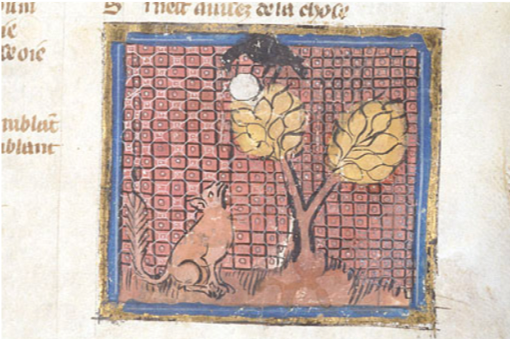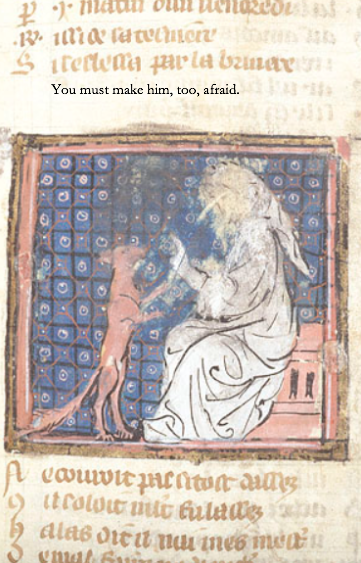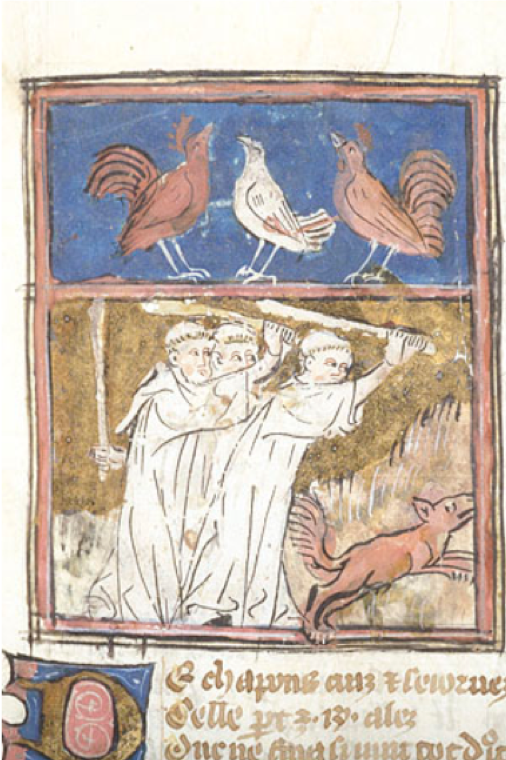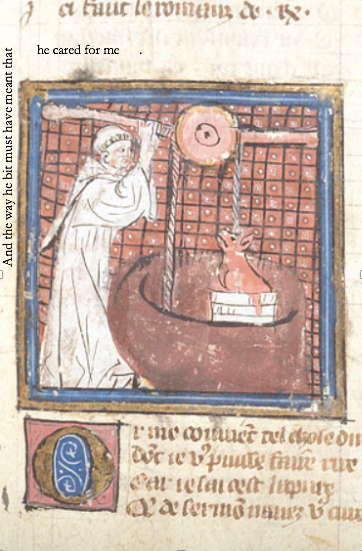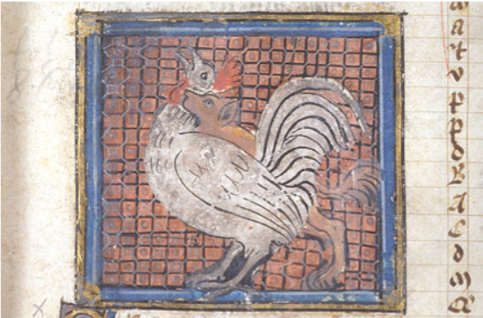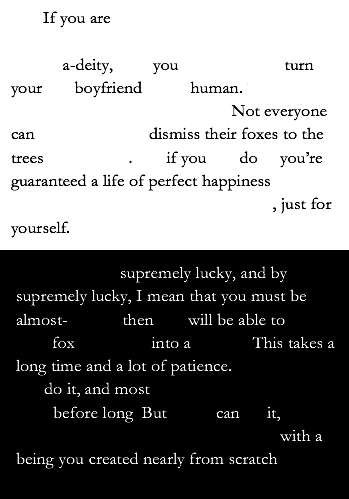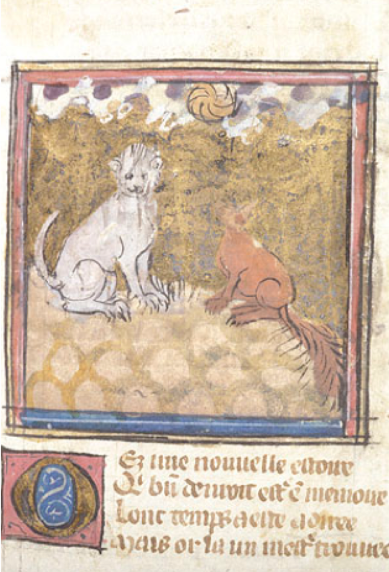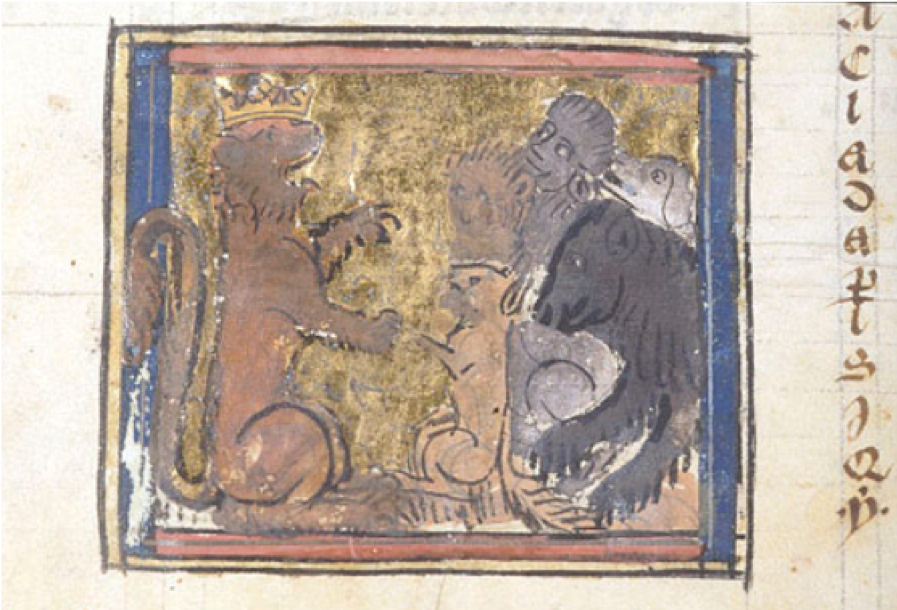Tender Grapes
Helen Armstrong
Tender Grapes
Helen Armstrong
Take us the foxes, the little foxes, that spoil the vines:
for our vines have tender grapes.
Song of Solomon, 2:15

ot all boyfriends were foxes, but all foxes were
boyfriends. All foxes belonged to somebody, and it
was up to that-body to decide what to do with their fox.
Except when it was up to the fox. People got killed by their foxes all the time / /
people get killed by their boyfriends all the time.
…read the full story here
Helen Armstrong is a queer writer living at the base of the Rocky Mountains in Colorado. She’s been published in After the Pause, Soft Cartel, X-R-A-Y, and others. She lives with her girlfriend, her cat Persephone, and several dying houseplants. She tweets @hkawrites.
Take us the foxes, the little foxes, that spoil the vines:
for our vines have tender grapes.
Song of Solomon, 2:15

ot all boyfriends were foxes, but all foxes were
boyfriends. All foxes belonged to somebody, and it
was up to that-body to decide what to do with their
fox.
Except when it was up to the fox. People got killed
by their foxes all the time / / people get killed by their boyfriends all the time.
![]()
But I was lucky, always. This is something that
I was told quite a lot as I escaped various harms and
fates that befell my classmates growing up. Four
kids died in a car crash that year I was a junior, and
the whole school wore black to mourn them the
next day, though it meant kids were laughing in their
spurious grief, set in a blackberry field that was all
sour, done for the season. Most of them hadn’t
known any of the dead kids: did not want to feel
sad. I stepped on someone’s foot and his fake
pain squirted on the floor like ink. It dissolved as
soon as it had been freed from corporeality: he said,
Thank you man, thank you. As if he, too, had been freed.
There were other kids who caught the flu every
year, and I never did. There was my cousin who
drowned in the summer-lake, and I did not. I always
felt I had been spared some awful thing, something
that I couldn’t have imagined.
Then one day after college was done and I had
left with no debt, lucky again, I met my fox
boyfriend.
![]()
You always knew your fox boyfriend existed,
even if you never met him. Some people didn’t want
to; others wanted to but were afraid. If you did want
to meet him, once you were old enough, you could
simply call for him. Wherever he was, he would
have to come to you. It was part instinct, part
tradition, and part, I suspect, something else.
Perhaps it was the mutual curiosity that acted
like a magnet, pulling you together. The moon
creating tides, washing fish up onto the shore, dead fish
bringing to fruition everything building in that
undulating sea. Calling for him felt like that: pulling
a wave to crest, knowing it would soon drench the
sand.
If you called for your fox boyfriend and he
never came, that was because one of the many perils
of the world had gotten to him before you did. This
was always sad. To know without knowing. To
want, and never to have.
Important: I had known since I was seven that
he was out there somewhere. I assumed that he was
in Russia, where they had first domesticated foxes. I
had always been lucky so there was no reason this Some people’s fox boyfriends will rip off
would not be the case. My fox boyfriend would be their fingers while they sleep, and they’ll wake up
ready to live around humans, ready to stay in my in a scream-pain, but it’s too late because their fox
house, drink my orange juice, and eat my toast. fox boyfriend is gone.
![]()
I became lonely and called. There was that
curiosity: what would he be like? I knew that he
would belong to me easily. I wanted to hold that
surety in my hands. I wanted to stroke its fur.
Beyond this, though, what? Inside of it: what was
he?
He was waiting for me at my door when I got
home. I set down my briefcase slow so he would see
that I could not cause him harm except with my
own hands. It felt like it would be a fair fight, if it
came to it, but then, I knew that it would not. Come
to it. My fox was domesticated.
His coat was auburn, the color of leaves raked
together and left in the mud to get rained on rather
than being swept into a trash bag. But then the sun
comes out and it sprays light on the pile of wet
leaves, and it turns them to what they once were:
red/gold, a little translucent.
His eyes were somewhere between green and
yellow, and sharp. Each of his pupils was made up
of two crescent moons holding one another.
His tail was thick and pressed against my door.
![]()
There was a long time where we just stared
at each other
If you are supremely lucky, and by supremely
lucky, I mean that you must be almost-a-deity, then
you will be able to turn your fox boyfriend into a
human. This takes a long time and a lot of patience.
Not everyone can do it, and most dismiss their
foxes to the trees before long. But if you can do it,
you’re guaranteed a life of perfect happiness with a
being you created nearly from scratch, just for
yourself.
You must teach him your manners and
customs. You must tell him stories that all humans
know: you must tell him which dangers all humans
are afraid of.
You must teach him to groan when he stretches
and unload the dishwasher silverware-first. You
must allow him to cry when he wants to cry,
because this, too, is human.
It is different than domesticating a wild animal.
It is different than raising a dog. You must teach
your fox boyfriend about traffic jams and the rovers
on Mars. You must teach him to care about these
things, but in the right ways.
When a rover dies and your fox does not howl,
you must scold him. You must explain to him that
we are sad, that the rover was an honorary human
because it was build by humans. When your fox
asks you why the rover cannot be just a rover, you
have no response.
![]()
My fox spent the first couple days in the
bathroom, because he was not yet toilet trained. I
couldn’t have expected any more of him, and I
explained that I could not let him out of the
bathroom to soil my carpets. He did not know how
to speak yet, but he told me anyway that he didn’t
see why he couldn’t stay outside while he learned.
There is no toilet outside, I said, so there is no
way to learn to use it.
And the cold was still hanging on to the air. To
keep him outside felt like an injustice, a disrespect.
![]() You have no response. You have no
You have no response. You have no
response. You have no response. You have no
I was someone’s boyfriend for a long time.
She was pretty and I wanted to love her more
than I did, which did not in itself equal loving her,
an unfortunate failure. But when my fox boyfriend
did not immediately care for me, I found
forgiveness already in my hands.
![]()
The first time I took my fox boyfriend to the
movies he refused to eat the popcorn. The movie
we saw was good, but he was less-than-impressed.
He told me halfway through that he needed to use
the bathroom, and I told him that he could go, but
he had to stay low and quiet so he wouldn’t
disturb everyone else. Than on his way he knocked
into all the legs in the row and people snapped and
groaned at him, and I scolded him when he got back
for not listening to my directions, for not being
quiet.
But then, I guess, it wasn’t him who made all
the noise.
![]()
Letting himself die?
My fox boyfriend liked to curl up on the
washing machine while it was running but did not
like the dryer. I suspect the aversion was because I
found him inside it once and yelled, told him to
never go in there again, that he could get hurt, that it
could turn on and kill him. I told him that it
happened all the time to people’s cats, and he told
me that he was not a cat, and that it had not hurt
him for nearly thirty minutes he had been sitting
in it before I found him. I told him that this was
because I hadn’t come in and closed the door and
turned it on. His eyes flashed at me when he told
me that he would have warned me he was inside
before letting himself die.
He said that the rumble of the washer made
him feel like it did when trucks would drive by on
highways that slided through the woods. If you were
near, he said, the trucks would create thunder and
then, an earthquake, and you’d always know it was
coming but you’d never be quite prepared. He said
that if you weren’t careful it could really bowl you
off your feet.
But he was always careful and always prepared
for the washing machine because he saw me loading
it. He’d trot over and jump on top and wait for
me to turn it on.
![]()
He was also an incredibly picky eater and rarely
liked what I cooked. I tried all different types of
cuisine, too. I tried Mediterranean many times. He
always spat out my falafel. I tried Italian but he
sucked a spaghetti noodle up into his mouth an
then allowed it to slide out, slow. He shook his head
as it dislodged from his lips and fell back onto the
plate. I made sushi once, presented it to him nice,
said had raw fish, knowing he hadn’t and Have you ever
he turned up his nose and wouldn’t even try it.
One night I brought him his plate with leaves
and sticks on it and told him to eat, that if he was
going to be such an animal I would treat him like
one, that he could eat wildness if he loved it so
much.
He didn’t eat but instead walked away. His tail
swished as he disappeared into the bathroom and
closed the door behind him. peed in the shower.
Later I found that he had.
![]()
He liked to playfully bite me when he was
happy.
The first time he did it, we were watching our
show, him next to me on the couch. Furry, small,
solid. He did not like to be touched, so it surprised
me when he nuzzled his nose under my hand. It
was a familiar movement to my fingers, and I
scratched beneath his jaw for a moment before he
dodged and caught my fingers between his teeth.
Bone to bone with just my flesh in the way.
My heart caught but he was not chewing to
hurt me. He was chewing for the joy of it, of
having something his own.
Dismembered fingers floated across my eyelids
at night. But my door was closed, and he could not
open it, because it was locked.
![]()
Of course, I didn’t lock my bedroom door for
my own protection. I was not scared of him. Of
course I wasn’t.
I locked it because I didn’t want him to start
getting any ideas about us sharing a room while he
remained so animal. And there were a lot of things
he could get into: the 50-dinar Iraqi coin from Dad
and Mom’s ashes.
![]()
I pictured my fox boyfriend coming in and
immediately the ashes would scatter across the floor,
and the coin would clatter and spin before landing
in the midst of my mother. I’d need to vacuum it all
up, pick out the coin and blow off the stray ashes
stuck to the small metal valley between the Tigris
and Euphrates, and the experience would be too
raw.
So I kept the door closed. Again, not for me.
For my things.
![]()
To be afraid of your fox boyfriend seemed to
me one of the worst fates. There were many people
who were. And whenever people got killed by their
fox boyfriends, the families always felt awful and
said they shouldn’t have been so pushy,
shouldn’t have forced their children to stay with
their foxes. You didn’t have to, after all. If you
weren’t patient enough it wouldn’t work out anyway,
and to be patient you needed to want it.
![]()
I made my fox boyfriend a collar with a tag.
The tag was bright red and dangled from it, had my
phone number on one side. Other people couldn’t
understand him when he spoke, and I didn’t want
him to get lost and not be able to come back to me.
He pulled at it with his paw and looked at me
with this expression that was hard to read. I couldn’t
wait until he was a human so I could always know
what he was thinking based on the set of his mouth.
I could tell if he loved me based on his cheeks and ears.
![]()
I went one day to the enclosure in the zoo
made for the fox boyfriends who killed their
humans. There were fences that encircled all the
enclosures and ensured that you couldn’t et too
close to the animals, but for most of them, this was
pretty much the extent of the security measures
expended. The giraffes and elephants and everyone
else knew pretty much their place. But these
particular foxes didn’t because they had been half-
taught that they belonged among the humans.
Of course, their privileges had been revoked
when they killed. But they couldn’t go to human-jail.
And they couldn’t get let out in the wild to kill
again if they felt like it.
Instead, they were relegated here. I got there
around feeding time and saw one of the zoo
workers do it. She wore these thick rubber gloves
and opened the tiny door quickly, set down a tray,
and pulled her arms back to safety before the foxes
could get too close.
They gathered around the tray, and I couldn’t
see what exactly was on it, but it was probably dead
mammals, little mice or rats or something, ordered
dead in bulk. Flies and other bugs swarmed, and I
saw one of the foxes snatch a fly right out of the air
with its teeth. It gnashed them a few times, its
mouth too big to justify such a tiny snack. But it
licked its lips and seemed satisfied and swished its
tail as it returned to the feast.
![]()
A giant chain link fence enclosed them, and
their food was pushed through a door toward
the back. All day people walked by and took
photos of the killing-things who weren’t
murderers, weren’t human, but weren’t foxes.
The zoo’s greatest freakshow.
My fox boyfriend began to construct me a gift
in the backyard. He would not tell me what it was
but borrowed my tools, and at night I heard him
hammering.
I asked him how he was holding the hammer,
the nails, and he said that was part of the surprise. I
watched the structure erect itself step by step in the
mornings’ light, like a flash frame film of the
Washington Monument going up. It seemed for
awhile like a pergola, and I entertained fantasies of
wisteria, and my man boyfriend and I, because he
would soon be a man if he was creating me such an
elaborate gift, sitting beneath it in the afternoon
shine, each of us reading some classic novel. And I’d
know that I had done it: I had tamed him, created
him in my own image.
I asked him again and again what he was
making, but he told me that it was a surprise, that he
didn’t want me to know. He had this particular type
of secretive look that I had always liked on him. It
meant that he was thinking of something to make
me happy; it meant that he was thinking of me,
period. Maybe he, too, was thinking of becoming
human.
![]()
At work people grew jealous of my fox
boyfriend. The women would all tell me how
difficult their own fox boyfriends were, with most
stories ending in defeat.
So I gave up and got myself a real boyfriend
and now we’re married. Any thoughts on
domesticating a man?
This was the theme. Of course, I was a man,
and took some offense at the assertion that a man
could possibly be wild.
Humans were bred to be humans, I told them,
and if your human boyfriend or husband isn’t
cooperating then maybe it’s something that you’re
doing wrong, or something you’re not doing right.
The latter seemed an important distinction.
![]()
I started to teach my boyfriend to read. It wild thing
was a key step in the process to becoming human, I
told him, and he was patient. We started out with
simple books. Where the Wild Things Are. The Little
Prince. The Very Hungry Caterpillar. I’ll eat you up.
I visited my dad and picked up the copy of
Aesop’s Fables that my mother had read to me and
tore out the story about the fox. Then I brought it
home and had my fox read the rest out loud to me,
while I laid across the couch and he laid stomach on
the floor with the book spread in front of him.
![]()
We were both planning something.
He told me that he wanted my gift to be a
surprise, so he ordered a canvas tarp and covered it
up every day. He only worked at night, and I obliged
by not peeking, even though I wanted to. Now that
he was near-human, I wanted to give him this small
respect.
Meanwhile, I was planning our first date, once
he was a human. I would take him to a very nice
restaurant that was near the zoo, and afterwards,
before dark fell completely, we would visit the fox
enclosure. He’d be able to see what he would have
been, what I had saved him from becoming.
I couldn’t wait.
![]()
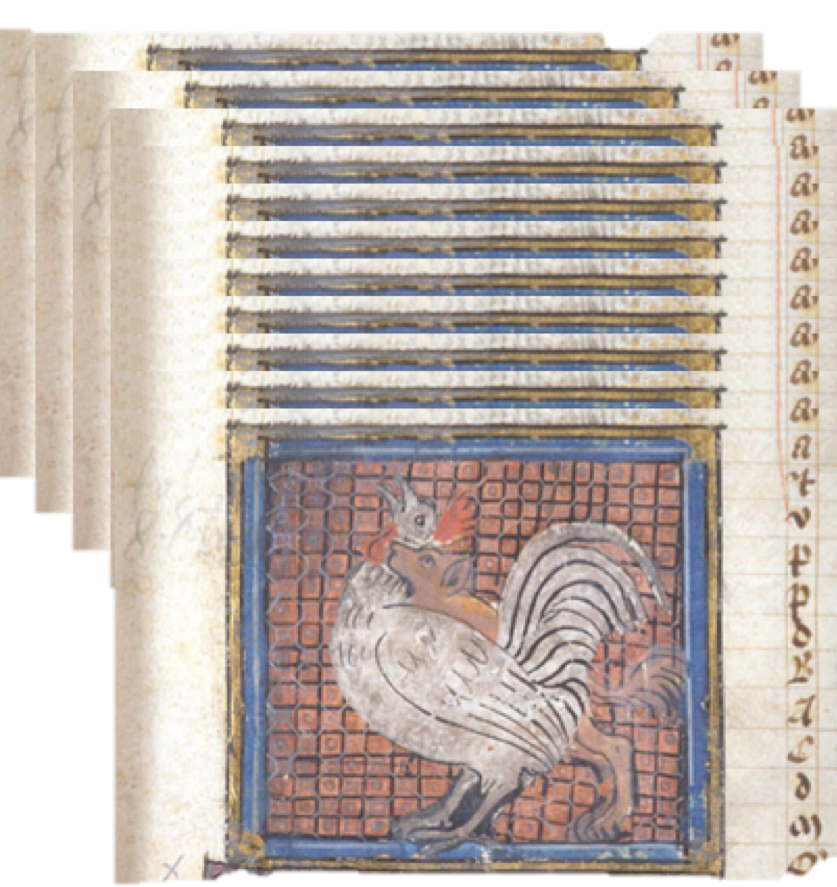
I heard him singing in the shower. He had
begun to prefer very hot water, as opposed to the
freezing chill he’d used before. His songs were not
human songs; I didn’t know what they were, how
they came from him, didn’t understand the lyrics
nor how the melodies worked. But they were sad.
Something about the rise and fall, fall, fall made my
chest constrict. I began to dread his showers.
![]()
He also learned how to cook rice, using his
mouth to hold the spoon. He would make it again
and again. I’d come home to mountains of rice and
him staring down as if punishing me for what I
had taught him to do.
I scraped most of it into the trash can.
![]()
One night I woke up and he was crying*. I
didn’t go to him because the moment felt too
intimate. I wondered if I loved him*. For all the **[after significant pause] what for?
wondering if he loved me, I had never asked this of
myself, because it seemed moot where * is a definition. I
decided that I would love him but did not yet. This *what for?
was good enough to fall back to sleep: and not good
enough to comfort him. **
![]()
In the morning once I told him between rays of
sun through the window that the traffic was bad an
I would have to leave early. He told me that he was
sorry. Traffic sucks, he said. “ ”
And caught us both by surprise.
![]()
He was still building something and kept telling
me that it wasn’t ready yet, it wasn’t time.
But I had never had to wait this long for
anything.
I woke up one morning and he wasn’t in the
guest room, wasn’t downstairs, wasn’t anywhere. I
looked out at the backyard: he wasn’t there either.
Just the tarp that rippled in the breeze and covered
the phantom gift. It was a large box quivering to be
unwrapped. I opened the back door and pushed out
into the day, stood in the yard for some time and
thought.
I’d promised myself and him that I wouldn’t
peek until he said that it was ready, but there must
be some clue beneath the tarp that would indicate
how close he was, how he felt about me, whether it
was all as near the end as I thought it was.
I shouldn’t look.
But the temptation was great.
I crossed the backyard. My feet and chest were
bare, but it was not cold, so it didn’t matter.
I lifted the tarp a little, because a small peek was
just a small betrayal, and a human life was filled with
those.
Thick | | | | metal | | | | bars | | | | stared | | | | at me
beneath the tarp, so close that I couldn’t squeeze
through. I lifted it further and then was beneath it,
pressed up against the outside of what was now
clearly a cage, the light muffled.
I only had a moment to stare and wonder
before:
The tarp was pulled from the cage and landed
in a heap to my left. I turned to see a man standing
there. I could hardly comprehend his solidity.
He was naked. His skin was tanned, his muscles
well-defined, his dark hair long and shaggy hanging
around his face.
His pupils, two dark slits surrounded by an
unsettling green, a damp forest, and through the
dripping trees, the moon, waning, almost new.
He grabbed onto my arm and I was silent,
stunned, as he opened a door in the cage and
pushed me inside. ” ,” and the
slamming door rattled the bars, though they did not
waver, not even a bit.
He pulled the tarp from the cage. A small
wind blew from it, the air that had collected
there releasing a sigh, and it swam around and
across his skin. The artificial breeze raised the
small hairs on his arms, on his chest, a trail
downward and a swarm, then his legs.
Tears on skin felt different from tears on
fur, that blanket that covered him and had
now been ripped off. He wondered who felt
the wind from his own blanket: from his fur.
Speaking felt wrong, but it was the only
way now. He no longer had an inner voice. It
had been severed. And so: he spoke the only
words he could think.
Helen Armstrong is a queer writer living at the base of the Rocky Mountains in Colorado. She’s been published in After the Pause, Soft Cartel, X-R-A-Y, and others. She lives with her girlfriend, her cat Persephone, and several dying houseplants. She tweets @hkawrites.
Helen Armstrong is a queer writer living at the base of the Rocky Mountains in Colorado. She’s been published in After the Pause, Soft Cartel, X-R-A-Y, and others. She lives with her girlfriend, her cat Persephone, and several dying houseplants. She tweets @hkawrites.

